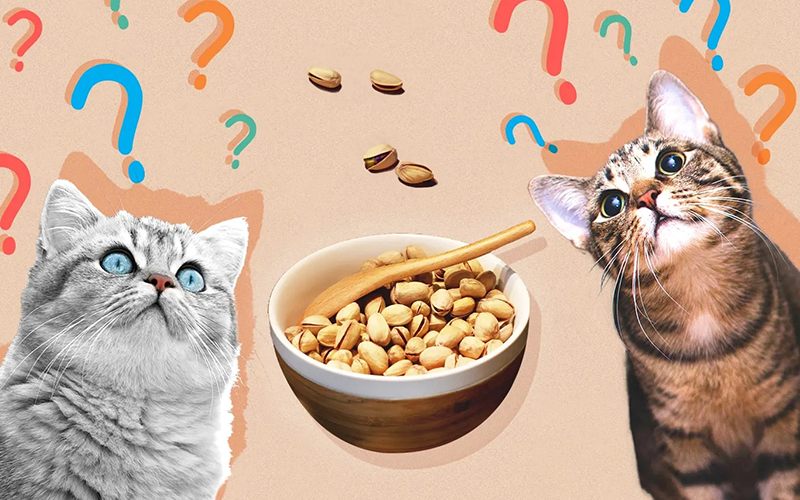Can Cats Eat Pistachios? A Guide for Cat Owners
- 25 Feb 2025 14:14
Pistachios are a popular snack enjoyed by many humans, but when it comes to sharing them with your feline friend, you may be wondering, can cats eat pistachios? The answer is not straightforward, and while pistachios are not considered toxic to cats, they are not an ideal food for them. There are several reasons why you should avoid feeding pistachios to your cat.
Let’s explore why pistachios aren’t the best choice for your cat’s diet and discuss healthier alternatives.

Why Cats Shouldn’t Eat Pistachios
High Fat ContentPistachios are high in fat, which can be problematic for cats. While cats do need some fat in their diet, too much fat can lead to weight gain and other health problems, including obesity and pancreatitis (inflammation of the pancreas). If your cat consumes too many pistachios, they may be at risk for these issues, especially if they are already prone to weight gain or have an existing health condition.
Choking HazardPistachios, especially the whole nuts in their shells, can pose a choking hazard for cats. Cats don’t always chew their food thoroughly, and a whole pistachio or a pistachio shell could easily get stuck in their throat or cause a blockage in their digestive system.
Toxicity of ShellsWhile the nut inside the pistachio is not toxic, the shell is another matter. The shells of pistachios are difficult for cats to digest and could cause serious intestinal blockages if ingested. These blockages could require medical intervention to resolve and could lead to more serious health issues, including vomiting and abdominal pain.
Salt and SeasoningsMany pistachios sold for human consumption are salted or flavored with various seasonings. Excessive sodium can be harmful to cats, leading to dehydration, high blood pressure, and kidney problems. Additionally, flavored pistachios may contain spices or additives (such as garlic or onion powder) that are toxic to cats. Even unsalted pistachios can be problematic if your cat consumes them in large quantities.
Digestive IssuesCats’ digestive systems are primarily designed for meat, and they may have trouble processing foods that are high in fiber, such as nuts. Eating pistachios can lead to gas, bloating, or diarrhea in some cats, especially if they are consumed in larger quantities.
What to Do if Your Cat Eats Pistachios
If your cat has accidentally eaten a pistachio or two, there’s no need to panic. However, you should monitor your cat for any signs of discomfort or distress. Look out for symptoms such as:
Vomiting
Diarrhea
Abdominal pain
Lack of appetite
Lethargy
If your cat shows any of these symptoms or if they have ingested a large number of pistachios, contact your veterinarian immediately for advice.
Healthier Alternatives for Cats
If you want to treat your cat to something special, there are many safer and healthier options than pistachios. Here are some alternatives that are better suited to your cat’s dietary needs:
Cooked chicken or turkey: Lean, cooked meat is one of the best treats for cats, providing high-quality protein.
Small pieces of cooked fish: Fish like salmon or tuna is a tasty and nutritious option.
Catnip: Many cats love catnip, and it’s safe and enjoyable for them.
Commercial cat treats: Look for treats that are designed for cats and are nutritionally balanced.
Small amounts of cooked egg: Scrambled or boiled eggs are a great source of protein for cats.
Canned pumpkin: Plain canned pumpkin (not the spiced variety) can help with digestion and is a healthy treat for cats.
Should You Use PettureX for Your Cat’s Health?
If you're ever uncertain about what foods are safe for your cat or if you need advice on their diet, consider using PettureX for 24/7 online consultations. PettureX provides personalized, expert advice that can help you make informed decisions about your cat’s health and well-being. Whether you’re unsure about a specific food or just want to make sure your cat is getting the proper nutrition, PettureX is a great resource for pet owners.
Conclusion: Can Cats Eat Pistachios?
In conclusion, pistachios are not a suitable food for cats. The high fat content, potential choking hazard, and digestive issues make them a poor choice for your cat. Additionally, salted or flavored pistachios could introduce harmful seasonings that can be toxic to cats. It's best to stick with healthier alternatives, like lean meats, fish, and specially formulated cat treats.
If your cat has eaten pistachios, monitor them for any signs of illness, and contact your veterinarian if necessary. For any questions about your cat’s health, don’t hesitate to use PettureX to get expert advice and ensure your feline friend stays healthy and happy!
Related

The Burning Question: Can Cats Eat Jalapenos? A Comprehensive Safety Guide
- 21 Apr 2025
Cool Temptation: Can Cats Eat Ice Cream Safely? The Vet-Backed Truth
- 21 Apr 2025
Frankly Dangerous: Can Cats Eat Hot Dogs? Vet Explains the Serious Risks
- 16 Apr 2025
A Purrfect Protein? Can Cats Eat Ground Turkey Safely? (Vet-Reviewed Guide)
- 16 Apr 2025
Gritty Situation: Can Cats Eat Grits Safely? Vet Explains the Risks
- 16 Apr 2025
Crunchy Query: Can Cats Eat Green Peppers? A Vet-Reviewed Safety Analysis
- 16 Apr 2025
Gravy Danger Zone: Can Cats Eat Gravy Safely? (Vet-Reviewed Warning)
- 16 Apr 2025
Toxic Temptation: Can Cats Eat Grapefruit? Vet Explains the Dangers
- 16 Apr 2025
Emergency Meal or Major Mistake? Can Cats Eat Dog Food For A Couple Days? (Vet Guide)
- 16 Apr 2025
Dandelions & Felines: Can Cats Eat These Common Weeds Safely? Vet Explains
- 16 Apr 2025
